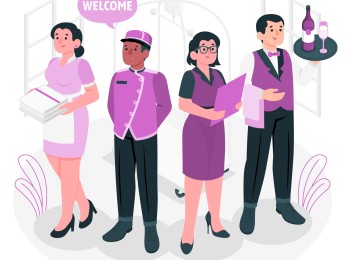Hospitality is an industry vital for society’s daily function. Travel and tourism are noted as the reason many communities are able to sustain themselves, and hospitality is the main industry that enables tourism. Conferences are a way to gather leading figures within the business hospitality industry, offer rewards, and share new innovations.
Conference and business hospitality management must go through several stages to remain successful. Planning and organising are vital, as an event can only exist with extensive planning. Plans should detail every function, employee and function required for the conference and the budget required to accommodate these. Once the planning is in progress, there should be a strong emphasis on promoting the event. A vast range of platforms and social media channels can be used for event promotion, and those in charge should investigate the desired audience and conclude on the primary way to reach them.
The final stage of conference management is meeting guest needs. Ensuring guests are entertained and enjoying the conference is the main sign of success. Communicating with guests and opening up a conversation regarding their satisfaction will allow for positive and constructive feedback and how to improve future events best.
Upon completion of this course, participants will be able to:
- Understand the importance of conference and business hospitality within an organisation.
- Explain the concepts and principles behind conference etiquette.
- Describe the consequences of poor conference and business hospitality management.
- Effectively organise different functions within the event to meet expectations and maintain engagement.
- Create a plan detailing each conference feature, necessary resources, and the budget.
- Coordinate different exhibits relating to the overall theme of the conference.
This course is designed for anyone within business hospitality management and those responsible for arranging and hosting conferences. It would be most beneficial for:
- Business Owners
- Operations Managers
- Planning and Design Managers
- Financial Advisors
- Hospitality Directors
- Project Managers
- Events Coordinators
This course uses a variety of adult learning styles to aid full understanding and comprehension. Participants will review case studies of successful conferences to highlight key functions that contributed to the success and potential challenges or shortcomings experienced.
A variety of learning methods will be offered to promote learning and ensure the participants gain an in-depth understanding of the taught content. Through a combination of presentations, discussions, role-playing activities, and individual activities, the participants will have ample opportunities to develop their knowledge and practise their learned skills alongside their peers.
Day 5 of each course is reserved for a Q&A session, which may occur off-site. For 10-day courses, this also applies to day 10
Section 1: Introduction to Business Hospitality
- Defining what business hospitality is, its necessity and importance within an organisation.
- Exploring what is typically involved within a business conference.
- What internal and external factors can influence the success of a conference.
- Managing resources, people, and quality throughout the conference lifetime.
- Describing the different roles within hospitality, their typical skills, competencies, and responsibilities.
Section 2: Planning the Event
- Understanding what needs to be planned and why – catering, entertainment, exhibitions, security and more.
- Establishing the goals and objectives of the event and how to ideally achieve these.
- Utilising various innovative methods to brainstorm and foster ideas for a memorable event.
- Exploring the expectations of potential guests and planning how to meet these.
- Methods and techniques to aid in creating a thorough plan.
Section 3: Promoting the Event
- Creating an eye-catching message to share across media platforms.
- Reaching out to successful professionals within hospitality to gain public support and awareness.
- Utilising different communication channels to engage with potential guests.
- Interpreting business data and investigating market research on the ideal methods of reaching the target audience.
- Ensuring promotion is consistent until the conference date.
Section 4: Managing all Functions
- Engaging with the organised functions within the conference and ensuring maximum efficiency.
- Offering motivational words and encouragement to those employed at the event.
- Monitoring performance throughout the conference.
- Delegating different tasks to employees based upon changing demand and their skill potential.
- Arranging external functions to enable guest accessibility – hotels, transport, registration and more.
Section 5: Attendee Focus
- Prioritising customer happiness and satisfaction throughout.
- Greeting guests upon arrival, throughout the conference and on departure.
- Being open to feedback and constructive criticism and making necessary adjustments where possible.
- Presenting and communicating with confidence in both language and body language.
- Ensuring accessibility within the conference for all guests.
Upon successful completion of this training course, delegates will be awarded a Holistique Training Certificate of Completion. For those who attend and complete the online training course, a Holistique Training e-Certificate will be provided.
Holistique Training Certificates are accredited by the British Assessment Council (BAC) and The CPD Certification Service (CPD), and are certified under ISO 9001, ISO 21001, and ISO 29993 standards.
CPD credits for this course are granted by our Certificates and will be reflected on the Holistique Training Certificate of Completion. In accordance with the standards of The CPD Certification Service, one CPD credit is awarded per hour of course attendance. A maximum of 50 CPD credits can be claimed for any single course we currently offer.
- Course Code IND15-103
- Course Format Classroom, Online,
- Duration 5 days














